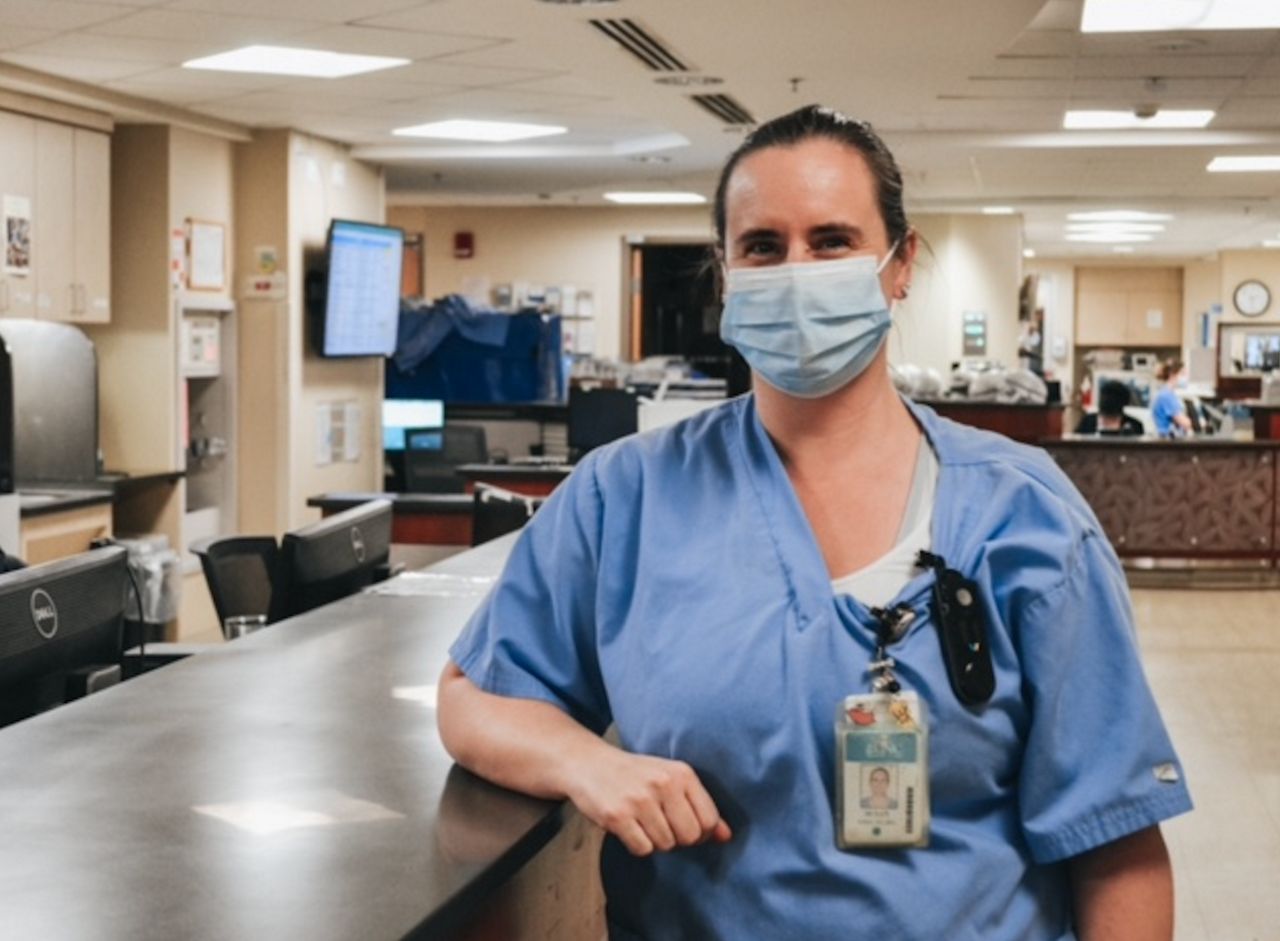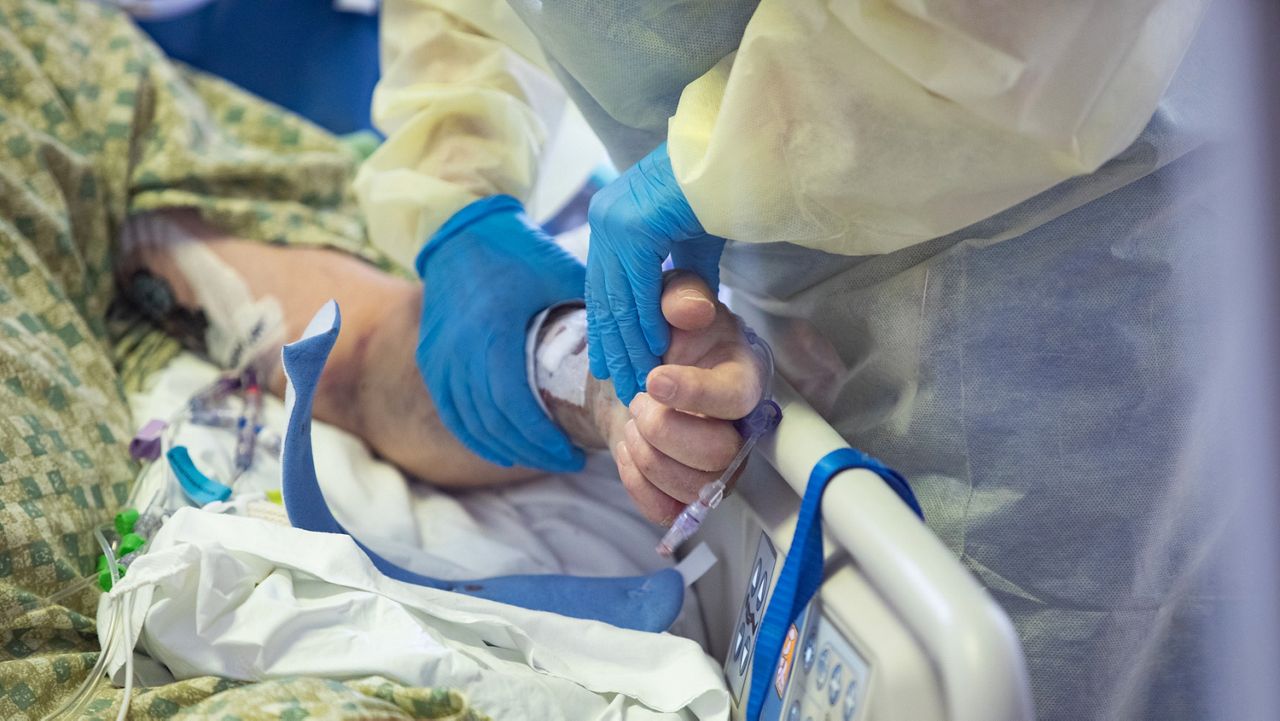Things are calming down at the medical intensive care unit at UNC Health in Chapel Hill, North Carolina. Nurses there have been in the thick of it through successive waves of COVID-19, treating some of the sickest patients in the state.
Across the country, the workers on the front line of the pandemic – nurses, respiratory therapists, doctors, other practitioners – are getting a chance to catch their breath as the omicron surge subsides.
“Even two years later, coming into work, sometimes I still get anxious,” said Susan Rowe, 39, an ICU nurse who has worked with COVID patients through the pandemic.
“When COVID first came out, the first surge was awful,” she said. “People were getting so sick and going into multi-organ failure.”
The next waves were no better.
“Throughout the delta surge, we did have a lot of deaths and that was very difficult,” said Allison Shrader, an ICU nurse manager with Atrium Health Mercy in Charlotte, North Carolina.
“Just seeing the amount of patients not make it,” she said, “I had not been through something like that before.”
During the latest omicron spike, UNC’s Rowe said she saw a lot of people in the ICU who had transplants or suppressed immune systems.

“They kind of let their guard down,” she said. After almost two years of wearing masks, social distancing and being careful to avoid the virus, some of the most vulnerable patients ended up in Rowe’s ICU.
But things really are looking up after the omicron spike. In North Carolina, where both Rowe and Shrader work in ICUs, the number of people in the hospital peaked at more than 5,000 in January. That number is now below 800, according to the state Department of Health and Human Services.
There’s been a lot of talk about staffing shortages and nurse burnout during the pandemic, but that was a problem before COVID too. Rowe wants to flip the script on that conversation and talk not about nurse burnout, but the strength of nurses.
“You see all these nurses portrayed crying and hugging each other and like ‘this is so awful.’ It’s awful. But we also need to stop and say, ‘look at how strong they are,’” she said.
“I feel like throughout the pandemic, a lot of the emphasis has been on nursing burnout, which has been very important to bring up, but I have to say that I like to stress that we’re not emphasizing the strength that the nurses have had,” Rowe said.
For Rowe, a focus on mental health, self care, camaraderie with her coworkers and being grateful have helped her through these past two years.
Rowe said she met with her therapist once a week through the worst of the surges.
“We were so busy, we didn’t have time to grieve. We didn’t have time to really take time and sit down with our feelings, and kind of make sense of everything that was going on,” she said. But taking that time each week for therapy gave her that time and space.
A lot of what’s happened over the past two years in the ICU still feels raw, Rowe said. She told a story about one patient who had trouble hearing and seeing. She didn’t make it, and she had to say goodbye to her six children over Zoom.
”We set up a Zoom meeting for her and her family members would have to say goodbye to her on Zoom, but she couldn’t hear what they were saying, so I had to stay in the room, listen to what they were saying and yell it into her ear so they could say goodbye,” Rowe said.
At the beginning of the pandemic, she said nurses would essentially be on their own with very sick COVID patients.
“We would just doff in and be alone in our rooms with our patients, and they were so sick. And there were times when the patient would decompensate and you would be alone,” she said. “I think it made you a stronger nurse and a stronger person, but one of the things about nursing is that it’s a team effort.”
Early in the pandemic, UNC Health switched to a model where nurses, pulmonary therapists, doctors and others on the COVID team would all work in one zone together.
They would each put on their personal protective equipment and be in the COVID zone for three to four hours at a stretch, with no breaks to eat or use the restroom.
“The camaraderie is what keeps you afloat in this pandemic,” she said.
In Charlotte, Shrader said that teamwork was part of what got her ICU nurses through the past two years.
“The strength of the nurses, it amazes me,” she said. “Seeing all the death and the hard times that we’ve been through, they pulled together.”
Shrader said she encourages the 80 nurses that work under her to take care of themselves, go for walks or read a book.
“We do feel like we’re getting back to a normalcy in the hospital,” she said. And with the lower case rates, nurses are able to get some time off.
“We are encouraging spending time away from the hospital to re-energize themselves. We do need that break,” Shrader said. “I am looking forward to this summer, just spending time with my kids and being able to take a break from work.”
The coronavirus is not going away. But with vaccines and effective treatments, society can better learn to live with the virus.
After two years of dealing with the sickest COVID patients, Rowe said she reminds herself to be grateful.
“Stop and be grateful, to think about how you were grateful for your PPE, you were grateful for your colleagues, you were grateful for the ability to continue nursing and be there for your patients and their families,” she said.
“I deal with this really tough situation, but I can go home. These people can’t go home, and then they can’t see their family members when they’re in the hospital,” Rowe said.



